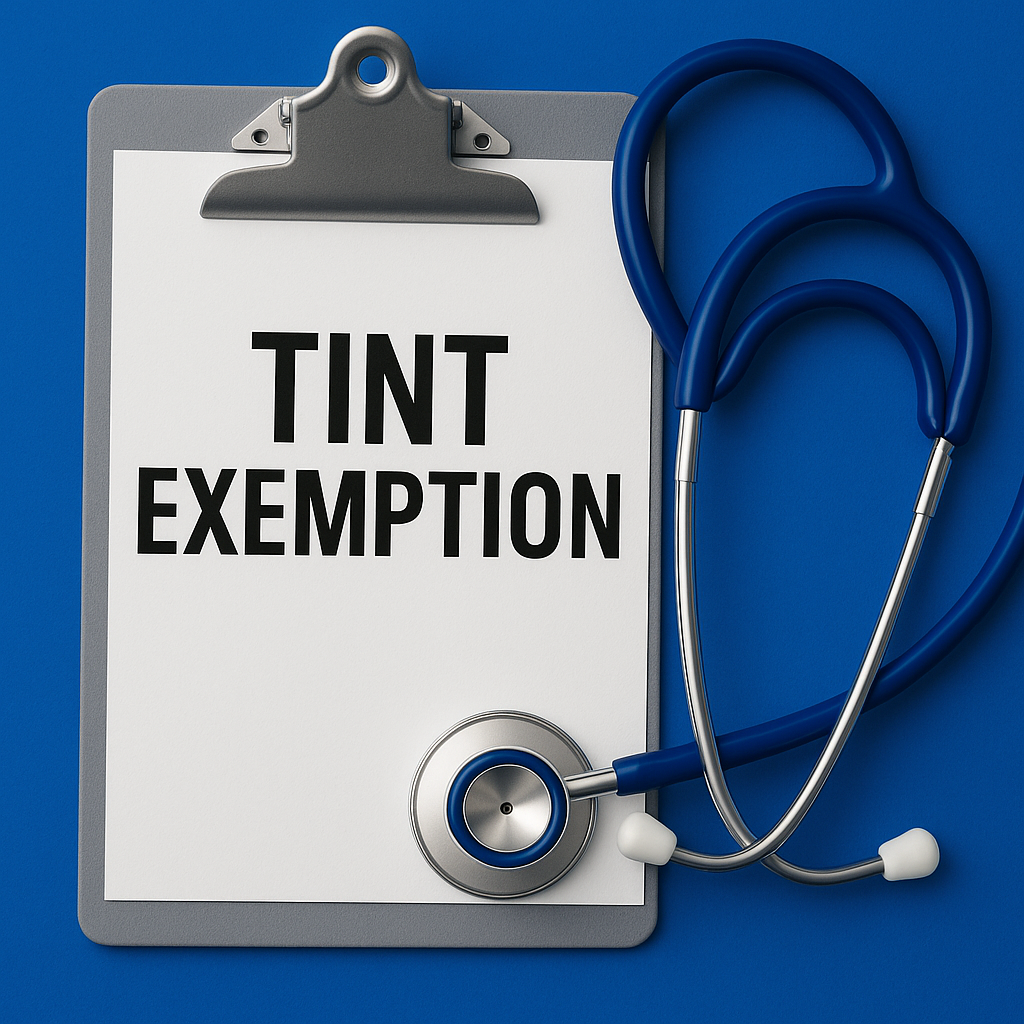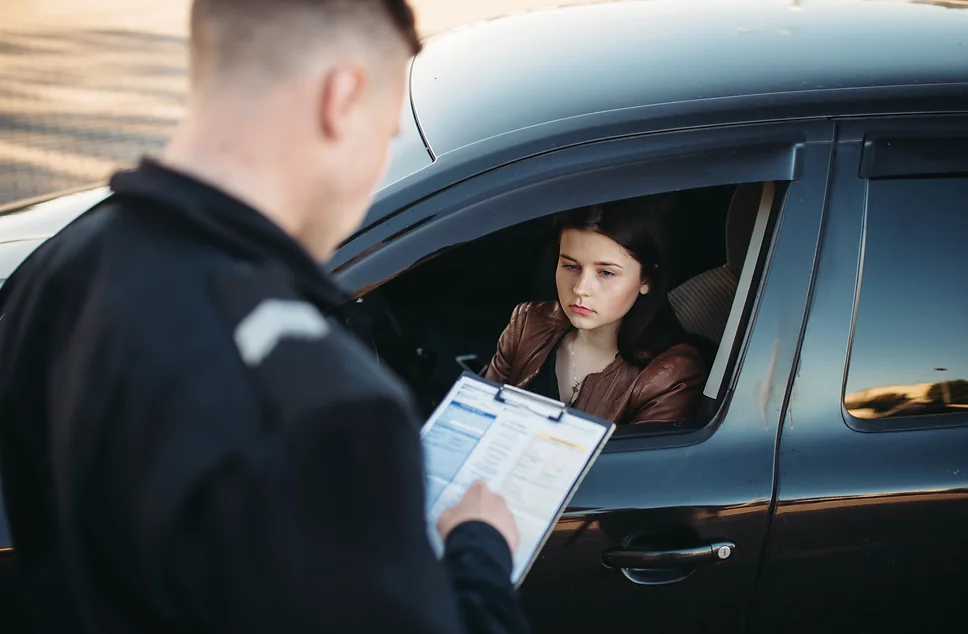*Receive an immediate full refund if we cannot get you approved for a Legal Tint Exemption*
A Florida window tint exemption allows individuals with qualifying medical conditions to install window tint darker than the standard legal limits. This is especially helpful for those who suffer from light sensitivity, autoimmune diseases, migraines, or other conditions aggravated by sun exposure. With an approved exemption, your darker window tint becomes legally recognized by the state—protecting both your health and your compliance with Florida law.
The exemption qualification process involves two parts:
A licensed physician must determine that your medical condition warrants the use of darker window tint. The physician must complete and sign Florida Department of Highway Safety and Motor Vehicles (DHSMV) Form HSMV 83390, providing a clear explanation of the medical necessity.
Once signed, the completed form must be submitted directly to the Florida DMV for approval. After the state processes your form, you’ll have official documentation that proves your tint exemption is valid. This certificate must be kept in your vehicle at all times and shown to law enforcement upon request.
While a medical exemption does allow for darker-than-legal tint, it does not mean unlimited darkness. The physician must determine the appropriate level of tint based on your condition, and the Florida DMV ultimately reviews and approves the recommendation. Once granted, your exemption allows for darker tint within medically justified limits.
ForeverTint can help make this process simple by connecting you directly with a licensed physician for approval, preparing the proper documentation, and sending everything to you by email with clear instructions on how to keep your exemption compliant.

While a medical exemption does allow for darker-than-legal tint, it does not mean unlimited darkness. The physician must determine the appropriate level of tint based on your condition, and the Florida DMV ultimately reviews and approves the recommendation. Once granted, your exemption allows for darker tint within medically justified limits.
ForeverTint can help make this process simple by connecting you directly with a licensed physician for approval, preparing the proper documentation, and sending everything to you by email with clear instructions on how to keep your exemption compliant.
Whether or not you plan to get a medical tint exemption, it’s important to understand Florida’s window tint laws. The state has strict guidelines that regulate how dark you can tint each window on your vehicle. These laws are enforced by the Florida Highway Patrol and outlined by the Florida Department of Highway Safety and Motor Vehicles (FLHSMV). They are designed to balance driver comfort with road safety, visibility, and law enforcement needs.
Non-reflective tint is permitted only along the top portion of the windshield, above the manufacturer’s AS-1 line. Tint is not allowed below this line unless you have a medical window tint exemption.
Tint must allow more than 28% of visible light to pass through (28% Visible Light Transmission or VLT). This means anything darker than 28% is considered illegal without a valid exemption.
Drivers of sedans must maintain a minimum of 15% VLT, while SUVs and vans can go darker. This provides more flexibility for larger vehicles, but it’s still subject to enforcement.
Same rules as the back side windows: 15% VLT for sedans, darker options permitted for SUVs and vans.
Front side windows: No more than 25% reflective
Back side windows: No more than 35% reflective

If you need darker-than-standard window tint in Florida especially on your front side windows or windshield—you’ll need a valid medical tint exemption. ForeverTint can help you find out if you qualify. Most applicants are approved, and once certified, you’ll be legally allowed to install darker window tint under Florida law.
Traditionally, getting a tint exemption in Florida meant making an in-person doctor’s appointment, explaining your condition, and handling paperwork yourself. ForeverTint streamlines this entire process online:
In the next section verify if you might have one of the qualifying conditions or something similar.
If you think you might be eligible, select “Purchase Your Exemption” (Fully refundable if you don’t qualify).
A member of our team will contact you to schedule your 5-10 minute verification phone call.
Get Approved and receive your signed legal tint exemption within 72 hours!
*For any reason should you not be approved for a Legal Medical Window Tint Exemption you will receive an immediate refund. In our experience only 1 out of every 50 applicants are not approved.
Florida law provides a medical window tint exemption for individuals whose health may be negatively impacted by exposure to sunlight. This includes conditions that cause increased sensitivity to ultraviolet (UV) light, visible light, or heat. Here are some of the most commonly recognized qualifying conditions:
Chronic or severe vision problems can be aggravated by bright sunlight. Darker tint can reduce glare, improve comfort while driving, and help protect eye health.
Eczema is a skin condition that can flare up due to heat and sunlight exposure. A tint exemption helps limit UV penetration, reducing the likelihood of painful flare-ups.
Some people experience rashes, burning, or swelling when their skin is exposed to direct sunlight. Darker tint acts as a protective barrier to prevent these reactions.
Lupus is an autoimmune disease where UV exposure can trigger serious symptoms, including skin lesions and fatigue. A window tint exemption allows for safer daily travel by reducing UV contact.
This condition causes skin inflammation and rash when exposed to light. Darker tint helps reduce UV exposure and prevent painful flare-ups.
Xeroderma makes skin especially sensitive to sunlight, which can lead to cracking, irritation, and damage. Extra tinting provides a layer of defense against sun-related irritation.
For individuals with melanoma or a history of skin cancer, limiting UV exposure is critical. A tint exemption allows for significantly safer protection during daily commutes.
People with albinism lack the protective pigment melanin, making them extremely sensitive to sunlight. Darker tint reduces harmful UV rays that can damage both skin and eyes.
Porphyria is a group of disorders that make the skin and nervous system highly sensitive to sunlight. A tint exemption helps limit painful and potentially dangerous reactions.
Sunlight can worsen scarring and slow healing of severe burns. A window tint exemption offers ongoing protection during recovery and beyond.
This rare genetic disorder causes extreme sensitivity to sunlight, leading to skin damage and other complications. A medical tint exemption provides necessary protection for daily life.
Bloom syndrome increases the risk of skin cancers due to UV sensitivity. Extra tinting safeguards individuals against unnecessary exposure while driving.
Vitiligo reduces pigmentation in the skin, which removes natural protection against UV rays. Tint exemptions help protect depigmented skin from damage.
Many autoimmune diseases, such as multiple sclerosis or dermatomyositis, involve increased sensitivity to UV light. Darker tint protects patients from flare-ups linked to sun exposure.
Texas law also recognizes that there are many less common conditions that may cause extreme sensitivity to light. If your physician determines that darker tint is medically necessary, you may qualify for an exemption even if your condition is not listed here.
The Florida window tint exemption form, officially known as Form HSMV 83390, is the required document that legally authorizes your vehicle to have window tint darker than what is normally allowed. Without this form on file and in your possession, even medically necessary tint can result in a ticket or issues with vehicle registration.
The Florida window tint exemption form, officially known as Form HSMV 83390, is the required document that legally authorizes your vehicle to have window tint darker than what is normally allowed. Without this form on file and in your possession, even medically necessary tint can result in a ticket or issues with vehicle registration.
To be valid, the Florida window tint exemption form must be:
Completed and signed by a licensed physician or optometrist
Include the physician’s full name, contact information, and medical license number
State the specific medical reason the patient requires darker tint
Clearly indicate whether the exemption is temporary or permanent
Include the patient’s full name and date the form was issued
This signed document must be kept in your vehicle at all times. If you’re stopped by law enforcement or your car is inspected, presenting this form proves your tint is legally authorized under Florida law.
Verbal explanations or handwritten notes are not accepted as proof. Florida law requires this specific, signed affidavit. Without Form HSMV 83390 on hand, your vehicle’s darker tint will be treated as illegal even if you do have a legitimate medical condition.

Motor Vehicles: Chapter 316 Section (1)
(316.29545) Window sunscreening exclusions; medical exemption; certain law enforcement vehicles, process server vehicles, and private investigative service vehicles exempt.
(1) The department shall issue medical exemption certificates to persons who are afflicted with Lupus, any autoimmune disease, or other medical conditions which require a limited exposure to light, which certificates shall entitle the person to whom the certificate is issued to have sunscreening material on the windshield, side windows, and windows behind the driver which is in violation of the requirements of ss. 316.2951–316.2957.

Florida allows individuals to receive a medical window tint exemption if they have a health condition that requires additional protection from sunlight or ultraviolet (UV) rays. Common qualifying conditions include lupus, albinism, photosensitivity, chronic migraines, and certain skin or autoimmune disorders. A licensed physician must verify that your condition requires darker-than-standard window tint for medical reasons. ForeverTint connects you with a licensed physician who will assess your condition and determine eligibility.
To get a Florida tint exemption, you must have Form HSMV 83390 completed and signed by a licensed physician or optometrist. ForeverTint simplifies this process by providing a phone consultation with our licensed medical team and mailing you the completed and signed form once approved. You’ll then submit the form by mail to the Florida DMV. It’s important to carry this document in your vehicle at all times to prove your exemption.
Yes, while the state does not offer an online application directly through the DMV, you can begin the process online through ForeverTint. Our service allows you to consult with a licensed physician from the comfort of your home, and we provide the signed exemption form and instructions for mailing it to the state. This online convenience saves time, avoids in-person appointments, and ensures your form is filled out correctly.
Medical conditions that make a person sensitive to sunlight, UV rays, or heat are typically considered eligible. These include conditions such as lupus, melanoma, photosensitivity, chronic migraines, and other dermatological or autoimmune disorders. The final determination is made by a licensed physician based on your symptoms and health history. ForeverTint ensures that all evaluations are done according to Florida law.
With a valid medical exemption, Florida allows you to install window tint that is darker than the standard legal limits, including on the front side windows and windshield. The exact darkness level isn’t explicitly defined in statute but must be reasonably necessary based on the medical condition. Your physician will determine what is appropriate, and your exemption form will justify the darker tint. Always carry your signed exemption in your vehicle to remain compliant.
If you’re pulled over, you must present your signed medical exemption form to law enforcement. This document must clearly state the medical necessity, physician’s signature, and whether the exemption is temporary or permanent. As long as the form is valid and in your possession, you should not be cited for illegal tint. ForeverTint ensures your documentation includes all required details to satisfy state law.
The need for renewal depends on whether your medical condition is classified as temporary or permanent. Some exemptions are issued with no expiration, while others may require annual renewal if your condition is subject to change. Your physician will note this on the exemption form. ForeverTint provides guidance during your consultation so you understand whether renewal will be necessary in your case.